Considered too old by studio executives at the age of just 30 while filming the original TV pilot of Mulholland Drive, Naomi Watts’ career is proof that the American Dream actually exists. Since her long-awaited breakthrough in David Lynch’s masterpiece, she has gone onto amass a truly remarkable filmography, highlighted by two Academy Award nominations for 21 Grams and The Impossible, respectively. Naomi Watts is one of Lynch’s most iconic leading ladies, and she is this week’s performer of choice on “As Seen on Twin Peaks.”
This series takes a look at the acting careers of the cast of Twin Peaks — one performer at a time. But instead of looking A-Z through their entire filmography, I’ll be picking out one film to represent each actor, which will be followed by a 10 Questions-style discussion between myself and one of my fellow 25YL staffers about the film and various other credits. Now, the films I’ve picked to be discussed are not necessarily each actor’s most famous role, or most critically acclaimed performance, or biggest box office success. Instead, I’ll be focussing on those hidden gems, overlooked treasures and underrated masterpieces. And, to make things more interesting, each article will feature a range of different perspectives between myself and my guest. Some films will be familiar to the two of us, others might be first-time watches, and some movies will be a completely new experience for us both.
So, join Caemeron Crain and I as we discuss Naomi Watts, her career, Twin Peaks, Funny Games and more!
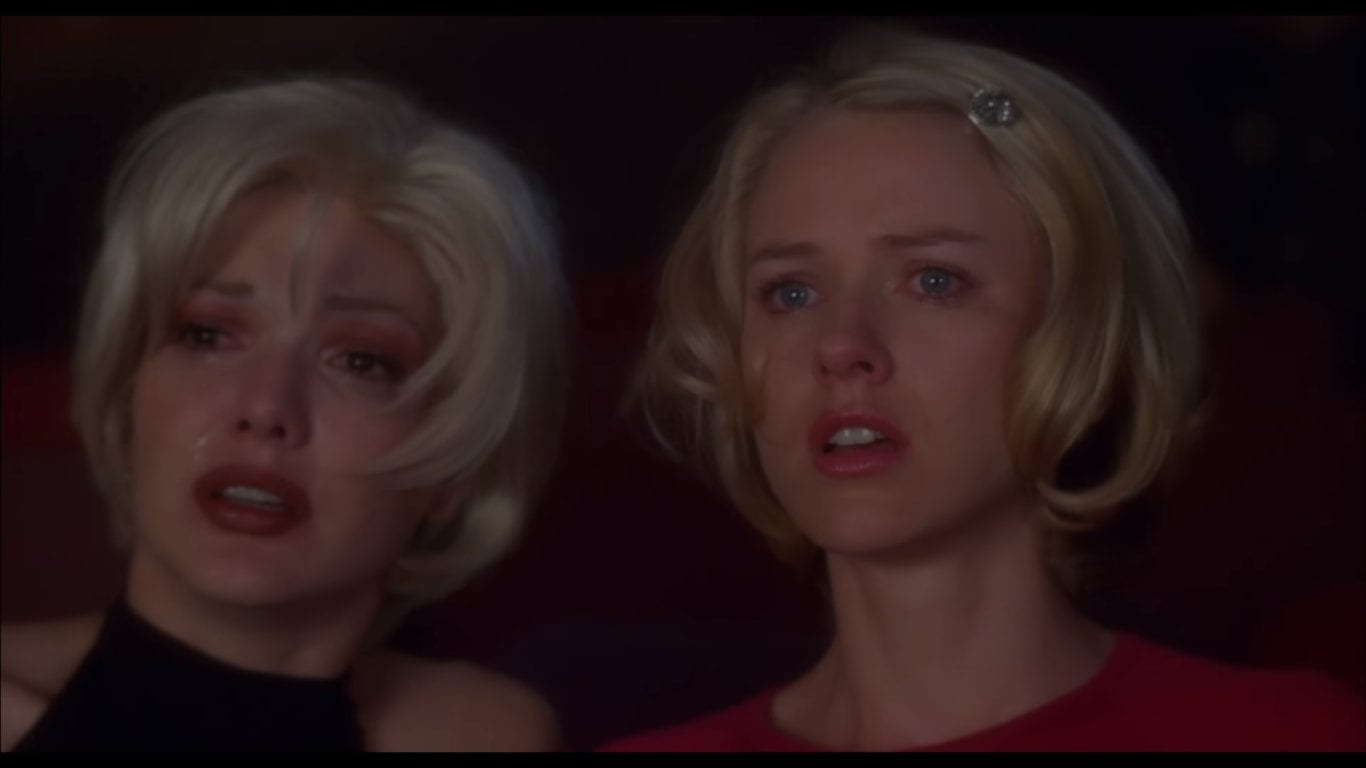
Jon Sheasby: There are so many incredible films from Naomi Watts’ filmography that could’ve been selected to be discussed, but Funny Games is the movie you wanted to talk about, Caemeron, so why did you pick this film in particular?
Caemeron Crain: Well, I suppose first of all because I think it is a great film; it’s brutal, but there is also a dark humour to it. I’m a big fan of Michael Haneke’s work. I think he plays with nihilism in really interesting ways, although maybe not all of his films do that. In The Seventh Continent — where the leads are also named Anna and Georg, for whatever that’s worth — it’s just bleak. In Funny Games it is horrific, but you’ve also got things like Paul talking to the camera, rewinding the action, and so on. And this stuff where George keeps asking them why they are doing this, and Paul makes stuff up and asks if that’s what he wants to hear. In reality, for example, there is a mass shooting, and everyone wants to know why. Is it because of the music the guy listened to or his difficult upbringing? Is that what you want to hear? How much harder if the answer is nihilism?
There is this level of Peter and Paul playing games with this family that I just find fascinating because it is like this glimpse into something that is so realistic; so possible. Whether or not it is based on “actual events” it strikes a chord in terms of all of this senseless violence in the world and enacts a certain critique of us as spectators to it. As if we like it, but only when it is just unrealistic enough; make it real and we recoil. People walk out of the theatre. And yet something like Saw is a smash hit.
JS: It’s not uncommon to see English-language remakes of successful foreign films (Infernal Affairs|The Departed, Let the Right One In|Let Me In, Ringu|The Ring), but it is rare for a director to remake their own movie like Michael Haneke did with Funny Games. When you compare the 1997 original to the 2007 remake, which do you consider to be the superior film?
CC: That’s hard. I’m a fan of Michael Haneke’s work in general, so I also find it interesting that he decided to remake the film in English about 10 years after the original Austrian version. Why do that? I generally oppose this idea of remaking things just to put them in English. I guess I think people should be willing to watch a film with subtitles, and something usually bothers me about the whole thing. (Even more so when they decide to make an American version of a British thing — it’s already in English!)
Let the Right One In was great, for example, but then I never bothered to see the English version. With the other two you mentioned it was the other way around, though; I never sought out the original. And then with The Girl with the Dragon Tattoo, I tried to go from the Fincher version to the Swedish series of films, and I just couldn’t do it. Maybe I could now since it has been a few years, but the difference between the actors and the vibes of the films was just too much for me at the time. And I’m not saying that the Fincher version was better; I am saying that I almost wish it didn’t exist and that I had just watched the Swedish trilogy if that makes any kind of sense.
So, to me, it is really interesting that with Funny Games it works. I like both versions, perhaps equally well. I almost even like the English version better, although I saw it after having seen the original. The scene with the car race on TV in the background was more powerful to me being able to understand what the announcers were saying. They didn’t even subtitle that for me when I saw the original. But also, the performances are great. Besides Naomi Watts, you’ve got Tim Roth, and I think this was when Michael Pitt really made an impression on me. That’s no offence to the actors in the original — they are great, too — but I think this is when Michael Pitt really got on my radar as an actor. And then I loved him on Boardwalk Empire and got excited when he showed up on Hannibal. But, yeah, the thing is that the only real difference between the two versions is what I just mentioned.
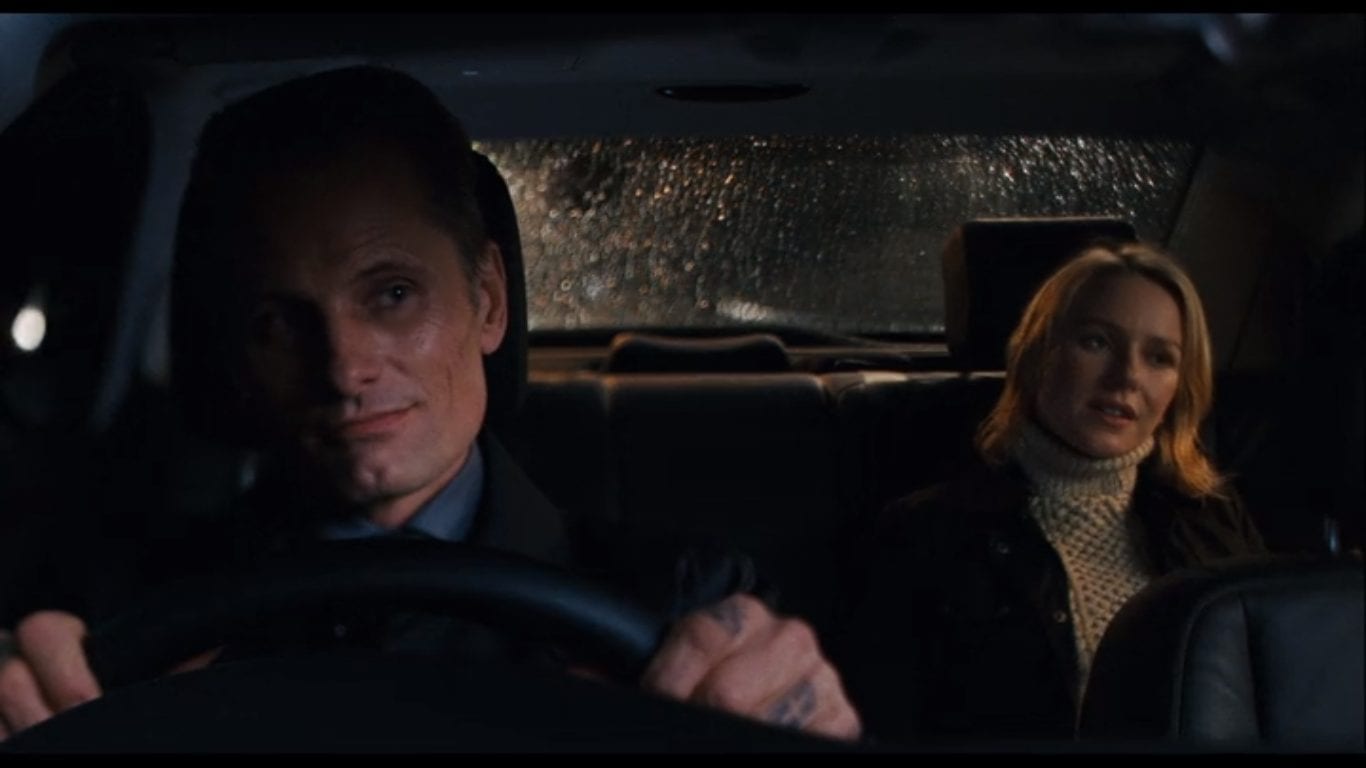
JS: Not only did Haneke remake his own film, but he also chose to reproduce the 2007 version of Funny Games as a shot-for-shot remake of his earlier effort. The most famous shot-for-shot remake is probably Gus Van Sant’s experimental version of Psycho, which was both a critical and financial disaster, despite earning the admiration of filmmakers like Quentin Tarantino. You’re obviously a fan of Haneke’s Funny Games, but what about the idea of shot-for-shot remakes in general? Can you appreciate this type of experiment on an artistic level, or would you rather see a filmmaker do something completely different with a property like John Carpenter did with his extraordinary remake of The Thing?
CC: It’s the kind of thing I would usually be against — a shot-for-shot remake — I mean, just watch the original film. I’m actually more on-board with it when it comes to Haneke doing this with his own film than I was with something like Gus Van Sant’s Psycho. I saw that in the theatre when it came out, without knowing that he had gone shot-for-shot, and I recall wondering what the point of making it was. I mean, here I was a fan of the director, and of a number of the actors, but all I could think was, “Well, Hitchcock’s was better.” Granted, I was all of 18 years old at the time, so maybe I would assess it differently now, but I sort of doubt that I would.
I am much more interested in those who do something novel. I enjoyed Bates Motel, for example, since you mentioned Psycho. And, yeah, The Thing is great. You could remake that again now, actually, just to up the production value; same goes for most Carpenter films. With Romero, too: I thought the 2010 version of The Crazies was excellent.
I guess, basically, I oppose remakes when the original is already excellent: Willy Wonka, RoboCop, Psycho… It’s like your band deciding to cover “Comfortably Numb” — don’t do it! There’s no point; unless maybe you are going to do something weird with it; but then get ready for the backlash to your goth-industrial remix of Pink Floyd (I just made that up, but if it exists please let me know because I would like to listen).
All of this makes Haneke’s remake of Funny Games stand out to me. These are the opinions I have, generally, and yet I love this film. The fact that it was he himself who did it is probably a big part of that because I get to thinking about why. I don’t think it was just because he wanted to expand the audience or whatever. I think it is because of what is going on with Funny Games — this critique of our role as consumers of violence and so on — that he felt the need to bring it to America. It’s almost like it should have always been an American film if that makes sense. And, though I say that as an American, it certainly is not with any pride.
JS: Due to its fantastic cast, I’d personally give the slight edge to the 2007 version of Funny Games, which was led by future Twin Peaks: The Return co-stars Naomi Watts and Tim Roth. At this point, I’d normally ask what you thought about Naomi Watts’ performance in the film, but since Tim Roth also stars in the movie it seems logical to ask your opinion on both. Did their collective work improve upon the original? Were they a good fit for Haneke’s sadistically unique vision?
CC: I read somewhere that Tim Roth was so traumatised by making the thing that he has never seen it. I don’t have a verified source on that, so maybe it is apocryphal, but it makes sense to me if it is true. To answer your question, I felt like they were a great fit. I mean, I think it was pretty much only this cast that got me to esteem this remake so highly. With Naomi Watts, everything is sort of there in the first act of the film — the first 25 minutes, let’s say — the whole thing with the eggs, she goes from being friendly in a way that almost seems naïve, to being suspicious, to being angry; I feel like she shows this whole range right there at the beginning of the film, and it is all believable. She’s this bourgeois wife going on vacation to Connecticut, or Long Island, or wherever it is supposed to be, but she’s no dummy. When things start to go wrong, she feels that they are wrong. I guess I can’t remember how much tension I felt in the scenes about the eggs the very first time I saw the film, but goddamn is there tension now.
And then I feel like she basically cries for the rest of the film, which is impressive, too — and then what I think of is the NASCAR scene, which I mentioned before. I think that might be the best scene in the film — in both versions of the film, to be honest — the work Naomi Watts does silently there stands out. And it strikes me that she knew exactly what she was getting into. She has an Executive Producer credit on this, after all. Tim Roth is great as George in that scene, too, but Naomi Watts’ turn as Ann just blew me away. And then every scene after that; I feel like she showed quite a range in this one.
It becomes clear that she is really the stronger one when it comes to this couple. Tim Roth does a great job portraying that kind of man George is: conflict-averse, rational, or committed to reason, etc. He keeps asking why Peter and Paul are doing this, and looking for reasonable ways out; so, their nihilistic games really crush him. I really appreciate how well Roth brings that across because I can relate to it so much, and it seems to be different from the kind of character he usually plays. He’s quite vulnerable in this film.
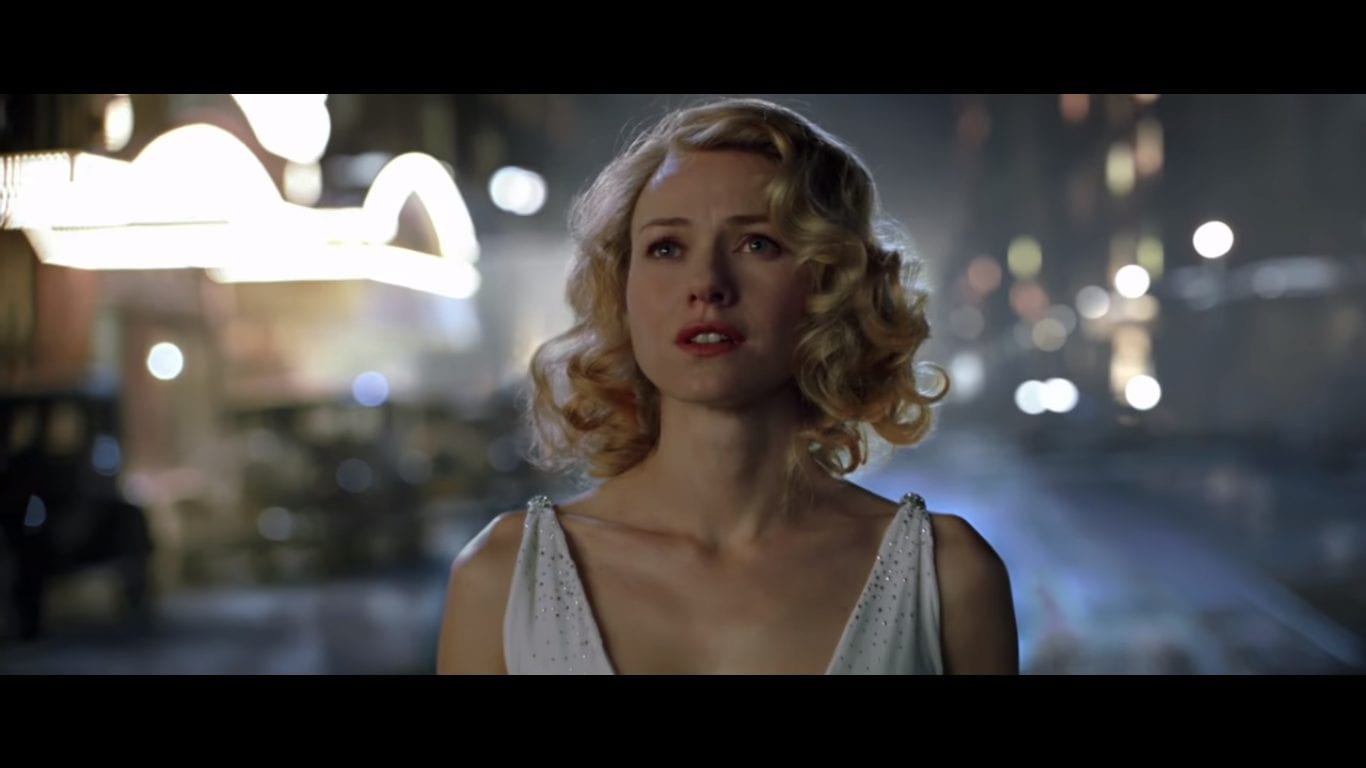
JS: Throughout her career, Watts has built a diverse catalogue of credits having starred in high-profile remakes such as The Ring and King Kong, while earning multiple Academy Award nominations and developing working relationships with iconic filmmakers like David Lynch and Alejandro González Iñárritu. It took her a while to reach the top of Hollywood, but she has managed to stay extremely relevant in the years since Mulholland Drive, which is perhaps an even more impressive feat given the roles normally assigned by Hollywood to women approaching their 50th birthday. How do you think she has managed to stay so relevant, and what is it about Watts that makes you admire her as an actress?
CC: I don’t know, other than to say she is great. I guess I might just say it’s her chops as an actress. She seems to effortlessly be able to express this joie de vivre that can border on naïveté but isn’t. And then turns on a dime to express what strikes me as a real feminine strength. I also think she has grown as an actor over the course of her career. She was in this movie called The Shaft (also known as Down), for example, with James Marshall. It’s about an elevator that kills people because it is possessed by a demon or something like that. It really isn’t a good movie, and I can’t say she was terribly good in it. I actually think it was one of those things where they shelved it and then released it when she became better known after Mulholland Drive. That really does seem like a turning point.
Maybe it is largely just that she started getting better roles, and she has continued to do so. You mentioned that she is approaching 50, and Hollywood’s tendency to ageism toward women. I wonder to what degree that may be shifting? Laura Dern and Jennifer Jason Leigh are both in their 50s, and their careers may be stronger than ever. Maybe these are outliers, but I guess part of me also worries that maybe it isn’t that the industry is becoming more open to older women so much as it tending to view 50 as acceptably young. I suppose that would be a good thing if things are shifting in that direction, but it still wouldn’t be addressing the underlying issue. So, I’ll be curious to see whether and for how long Watts keeps getting the kind of roles she deserves given her acting skills. I hope she does.
JS: Even though Watts’ pre-Mulholland Drive work is looked upon less favourably than her career post-Lynch, I think a majority of performers go through that stage in their life where nothing seems to be happening and only determination and self-belief is seeing them through audition after audition. Thankfully, her career skyrocketed after Mulholland Drive and her association with Lynch continues to be a fruitful collaboration after her involvement with The Return. When you look at Lynch’s most famous leading ladies, where does Watts as Betty Elms/Diane Selwyn and Janey-E Jones rank among the likes of Laura Dern and Sheryl Lee?
CC: This is such an unfair question. I mean, from one point of view it is impossible for me to rank them because each has done something so iconic and singular. There would be no Twin Peaks without Sheryl Lee, or, at least, I cannot imagine it. I can’t imagine anyone else as Laura Palmer, and from what I know about it, I think Maddy Ferguson would not have even existed as a character if it weren’t for the desire to get Lee more involved in the show. There would be no Mulholland Drive without Naomi Watts. Again, I can’t imagine another performer in the role. And with Laura Dern, for me, it’s Inland Empire. I love the film, and it couldn’t exist without her. I could imagine Blue Velvet with Jennifer Jason Leigh or Wild at Heart — the films would not be the same, and maybe wouldn’t be as good as they are with Dern, but I think they’d be possible. Not so with Inland Empire; that is a tour de force from Laura Dern that I couldn’t see anyone else pulling off.
So, from that point of view, I can’t rank them. From another perspective, I suppose I can, but it feels cheap because I am just going to shift to quantity instead of quality. Laura Dern has been in so much, and been great in all of it, that I’d have to rank her first, followed by Naomi Watts, and then Sheryl Lee. But again, that’s not about the quality of their respective performances — I can’t even do it in those terms — it’s about how much each has done with Lynch.
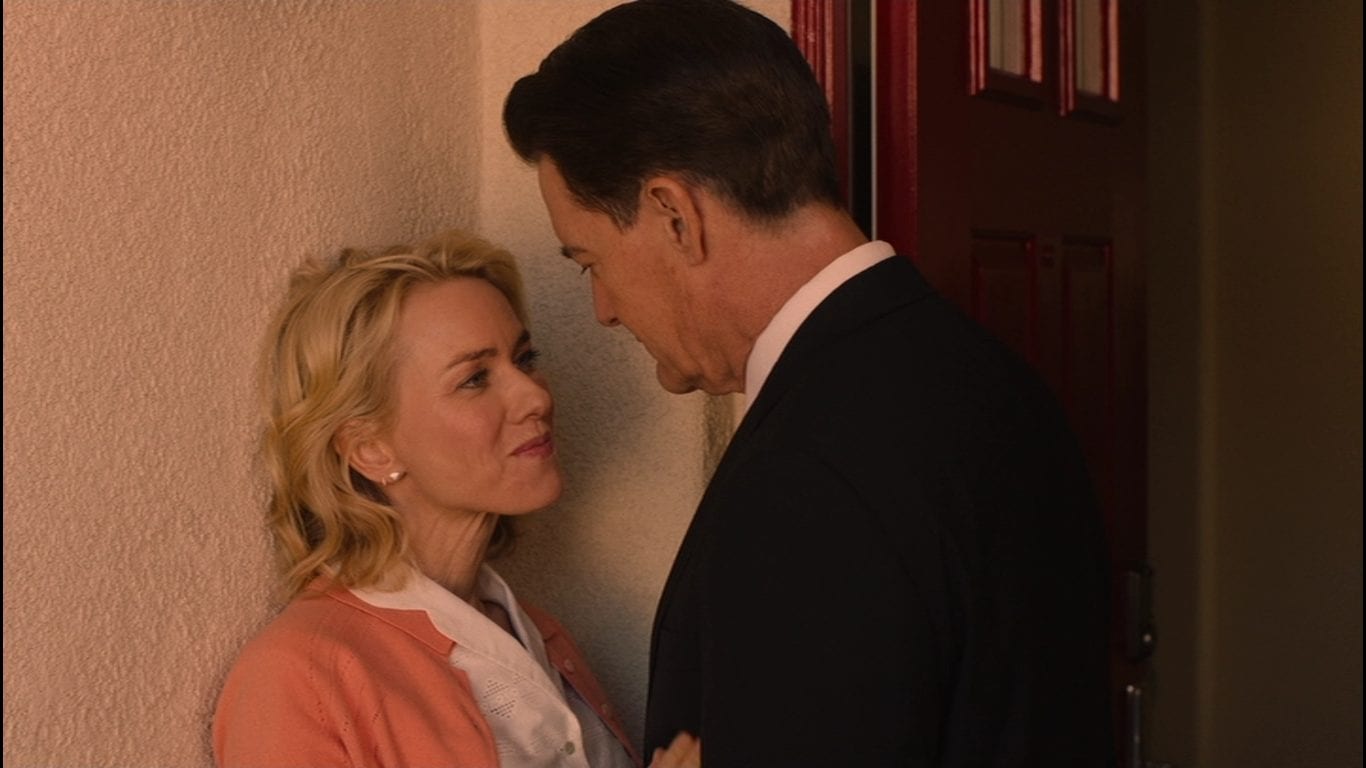
JS: I’m not afraid to admit that it took me a while to warm to Watts as Janey-E, as I initially found her performance to be slightly overacted and saw the character as incredibly one-dimensional. It wasn’t until that showdown with the criminals in Part 6 of The Return that I really began to like Janey-E and started to appreciate the offbeat performance Watts was giving. With that being said, what are your thoughts on Watts and Janey-E throughout the course of The Return? Did you warm to that character from the very beginning, or would you have liked to have seen Watts challenged with a meatier role such as Diane Evans?
CC: I loved her from the get-go. When she came storming out of the house to confront Dougie I think I cheered (I was watching alone) and when she slapped him I think I laughed. I don’t know how much of this boils down to how much I love Naomi Watts, but I do also think that Janey-E’s reaction is totally justified. I mean, her husband disappeared for three days and missed their son’s birthday party. That deserves a slap.
I guess I started seeing the depth to the character once they were inside when she learns about the money. It’s not that she shifts from being angry to being happy so much as she lets Dougie’s trespasses go for the moment. You start to get a sense of what their marriage has been like. I agree that the meeting at the park at noon-thirty was a definite highlight. Also, the scene with the Fuscos about the car shows us what a strong woman Janey-E is. I can understand why you might have felt like she was overacting a bit, but to me she fell right in line with some of my favourite moments of Lynchian dialogue, like in Fire Walk with Me when they guy at the diner pipes up with, “Are you talking about that little girl that got murdered?” That always makes me laugh, and it’s hard to say why, but Janey-E made me laugh a lot in the same sort of way.
So, I thought Janey-E was great. I’m sure Watts could have pulled off the role of Diane, but I guess I am less sure whether Dern could have pulled off Janey-E. That’s no knock on Laura Dern; you just got me thinking about it with your question. I’m not sure if I’d agree that the role of Diane was “meatier” — maybe just different. After all, Janey-E was a pretty important character when it came to Cooper’s whole arc.
JS: The story of the Jones’ is one that has inspired much debate between Twin Peaks fans, with many feeling too much time was wasted watching the adventures of Dougie, while others enjoyed the interactions between those in Las Vegas. Obviously, Part 18 is full of questions and loose ends which may never be answered, but one that has always interested me is whether or not the Jones family got a happy ending. How do you see the end of The Return from their perspective? Do you think Dougie, Janey-E and Sonny Jim go onto live a happy life or is the creation of the new Dougie just a way of paving over in cracks in the peculiar and quite sad story of the Jones’?
CC: I think they got the happiest ending of anyone if that’s an answer. I liked the theory that it was Cooper who came back to them and the new tulpa that was Richard, but I could never really buy into that. And then, we don’t see much, so it is hard to know how adequate this new Dougie is, or whether they go on to be happy. Happily ever after is not something that happens in real life, anyway, but I suppose I like to imagine that they got something along those lines. It is clear that Cooper improved their lives while he was with them, and I find it noteworthy that he tells Gerard that he needs him to make another Dougie. I think he is using the term in an ethical sense, as when he declines to have sex with Audrey in the original run and says that what he wants and what he needs are two different things. I will say I never felt like any of the stuff with the Jones’ was a waste of time.
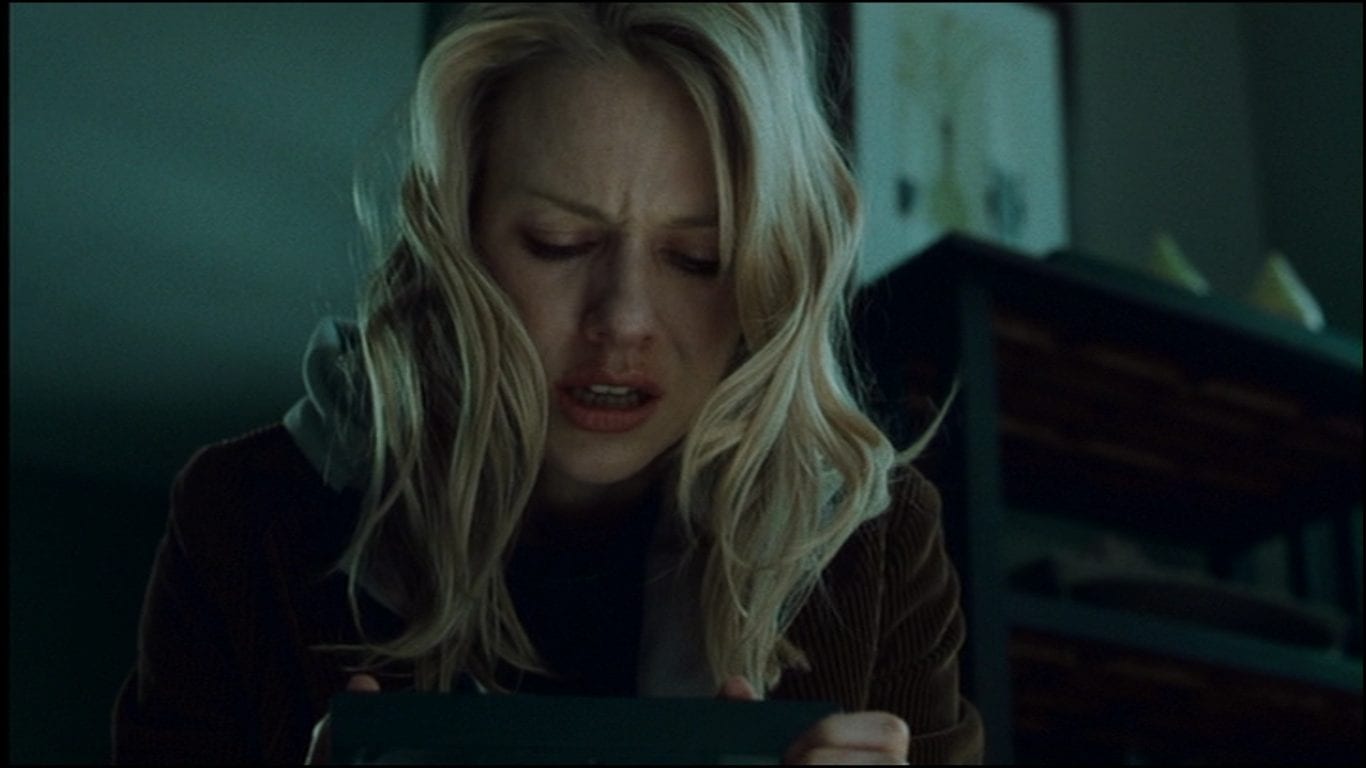
JS: I had originally intended to base this discussion around The Ring, which unsurprisingly scared the life out of me as an 11-year-old in 2002. And, not only does it remain one of my favourite Naomi Watts films, but it also ranks high among my favourite film remakes altogether. Besides what we’ve already talked about, what are some of your favourite films/performances that standout amid her vast and impressive filmography?
CC: The Ring was pretty scary! I can hardly imagine watching it at 11. I was in my early 20s but will admit that it freaked me out. In terms of your question, I recall finding 21 Grams to be quite good. I should probably watch that one again since I am struggling a bit to think of more to say about it.
I’m a big fan of I Heart Huckabees. I’m not sure if people always watch that one right. I was talking to a couple of friends about it recently and they didn’t have very high opinions. It is probably worth noting that these friends study philosophy (as do I) and that the film plays with philosophy; existentialism in particular. So, there’s this question of how you take it. I don’t think I knew the first time I saw it, but in a way that left me thinking I needed to watch it again. Probably a lot of people didn’t do that; I know these friends I was talking with didn’t do that, for example. But, for me, on a second viewing, I found the film to be hilarious.
Naomi Watts actually isn’t in it all that much, but I think she’s great in it. This little arc she has kind of exemplifies the film. She turns from being this model for Huckabees, who seems pretty shallow, to having what amounts to an existential crisis. She despairs about having to be pretty all of the time, and I think it gives a really interesting commentary on that whole thing. I don’t know if anyone else could have pulled that off quite the way she did.
JS: And finally, Caemeron, if you could recast any role from the history of film and TV with Naomi Watts in their place, which character would you choose and why?
CC: I knew you were going to ask me this because I have read the other pieces you’ve done in this series, but it’s been a real struggle for me to come up with an answer. There are a lot of ins and a lot of outs. I kept thinking about who I would be replacing, and for a bit was trying to come up with some film that was good but for a weak performance Naomi Watts could do better, and things like that, but I decided that approach wasn’t fruitful, and I wasn’t coming up with anything.
So, what my brain landed on when I sort of freed it up, was Working Girl; Melanie Griffith’s role in Working Girl, to be precise. And that’s no offence to Griffith at all — she was great in that film — it just seems to me that this is precisely the kind of role that Watts would kill. There is the same kind of range to the performance — from sort of naïve to headstrong, or whatever — and the same kind of strength, or competence, that comes through. I think you could plug Naomi Watts right in there and it would work. So that’s my choice.
I want to thank Caemeron for taking the time to join me for this latest edition of “As Seen on Twin Peaks.” So, you’ve read ours, but what are your thoughts on Naomi Watts? Favourite roles, performances, works? Please leave a comment and let us know by following the information about our social media accounts, which can be found below. Alternatively, you can follow me on Twitter (@JonSheasby), and we’ll continue the conversation over there.




